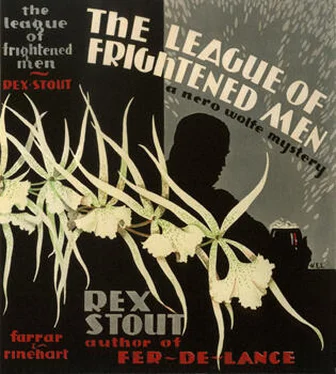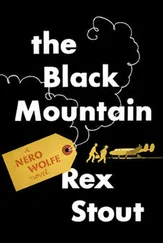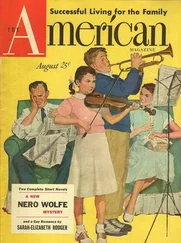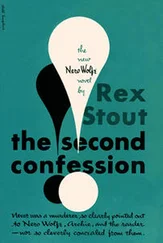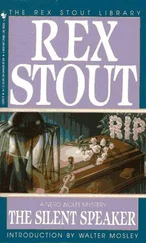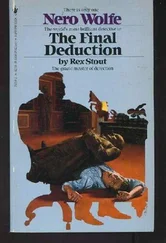He was saying, “It is a pity Mr. Farrell has deserted us. I am not sure that my next suggestion should await his return; and he does not, by the way, mention his return.” He picked up the note from Farrell and looked at it. “I believe, Archie, that you had best abandon the Hibbard search temporarily—”
He stopped himself; and said in a different tone:
“Mr. Goodwin. Hand me the glass.”
I gave it to him. His using my formal handle when we were alone meant that he was excited almost beyond control, but I had no idea what about. Then I saw what he wanted the glass for. He was looking through it at the note from Farrell! I stared at him. He kept on looking. I didn’t say anything. A beautiful suspicion was getting into me that you shouldn’t ever ignore a hunch.
Finally Wolfe said, “Indeed.”
I held out my hand and he gave me the note and the glass. I saw it at a glance, but I kept on looking, it was so satisfactory to see that a off the line and a little to the left, and the n cockeyed, and all the other signs. I laid it on the table and grinned at Wolfe.
“Old Eagle Eye. Damn me for missing it.”
He said, “Take off your coat and hat, Archie. Whom can we telephone in Philadelphia to learn where an architect there in pursuit of a commission might possibly be found?”
I started for the hall to put my coat and hat away, but before I got to the door I turned and went back.
“Listen,” I said, “the roadster needs some exercise. We might fool around with the phone all afternoon and not get anywhere. Why don’t we do this: you phone Farrell’s friends here and see if you can get a line on him. I’ll roll down to Philly and call you up as soon as I arrive. If you haven’t found out anything, I’ll be on the ground to look for him. I can get there by two-thirty.”
“Excellent,” Wolfe agreed. “But the noon train will reach Philadelphia at two o’clock.”
“Yeah, I know, but—”
“Archie. Let us agree on the train.”
“Okay. I thought I might get away with it.”
There was plenty of time to discuss a few probabilities, since it was only a five-minute walk to the Pennsylvania Station. I caught the noon train, had lunch on the diner, and phoned Wolfe from the Broad Street Station at two minutes after two.
He had no dope, except the names of a few friends and acquaintances of Farrell’s in Philadelphia. I telephoned all I could get hold of, and chased around all afternoon, the Fine Arts Club, and an architectural magazine, and the newspaper offices to see if they knew who intended to build something and so on. I was beginning to wonder if an idea that had come to me on the train could possibly have anything in it. Was Farrell himself entangled somehow in the Chapin business, and had he written that note on that typewriter for some reason maybe to be discovered, and then beat it? Was there a chance that he hadn’t come to Philadelphia at all but somewhere else, even perhaps on a transatlantic liner?
But around six o’clock I got him. I had taken to phoning architects. After about three dozen I found one who told me that a Mr. Allenby who had got rich and sentimental was going to build a library for a Missouri town that had been lucky enough to give birth to him and then lose him. That was a building project I hadn’t heard of before. I phoned Allenby, and was told that Mr. Farrell was expected at his home at seven o’clock for dinner.
I snatched a pair of sandwiches and went out there, and then had to wait until he had finished his meal.
He came to me in Mr. Allenby’s library. Of course he couldn’t understand how I got there. I allowed him ten seconds for surprise and so forth, and then I asked him: “Last night you wrote a note to Nero Wolfe. Where’s the typewriter you wrote it on?”
He smiled like a gentleman being bewildered. He said, “I suppose it’s where I left it. I didn’t take it away.”
“Well, where was it? Excuse me for taking you on the jump like this. I’ve been hunting you for over five hours and I’m out of breath. The machine you wrote that note on is the one Paul Chapin used for his poems. That’s the little detail.”
“No!” He stared at me, and laughed. “By God, that’s good. You’re sure? After working so hard to get all those samples, and then to write that note — I’ll be damned.”
“Yeah. When you get around to it... “
“Certainly. I used a typewriter at the Harvard Club.”
“Oh. You did.”
“I did indeed. I’ll be damned.”
“Yeah. Where do they keep this typewriter?”
“Why, it’s one — it’s available to any of the members. I was there last evening when the telegram came from Mr. Allenby, and I used it to write two or three notes. It’s in a little room off the smoking-room, sort of an alcove. A great many of the fellows use it, off and on.”
“Oh. They do.” I sat down. “Well, this is nice. It’s sweet enough to make you sick. It’s available to anybody, and thousands of them use it.”
“Hardly thousands, but quite a few—”
“Dozens is enough. Have you ever seen Paul Chapin use it?”
“I couldn’t say — I believe, though — yes, in that little chair with his game leg pushed under — I’m pretty sure I have.”
“Any of your other friends, this bunch?”
“I really couldn’t say.”
“Do many of them belong to the club?”
“Oh, yes, nearly all. Mike Ayers doesn’t, and I believe Leo Elkus resigned a few years ago...”
“I see. Are there any other typewriters in the alcove?”
“There’s one more, but it belongs to a public stenographer. I understand this one was donated by some club member. They used to keep it in the library, but some of the one-finger experts made too much noise with it.”
“All right.” I got up. “You can imagine how I feel, coming all the way to Philadelphia to get a kick in the pants. Can I tell Wolfe when you’re coming back, in case he wants you?”
He said probably tomorrow, he had to prepare drawings to submit to Mr. Allenby, and I thanked him for nothing and went out to seek the air and a streetcar to North Philadelphia.
The train ride back to New York, in a smoker filled with the discard from a hundred pairs of assorted lungs, was not what I needed to cheer me up. I couldn’t think up anything to keep me awake, and I couldn’t go to sleep. We pulled in at the Pennsylvania Station at midnight, and I walked home.
The office was dark; Wolfe had gone to bed. There was no note for me on my desk, so nothing startling had happened. I got a pitcher of milk from the refrigerator and went upstairs. Wolfe’s room was on the same floor as mine; mine overlooking Thirty-fifth Street, and his in the rear. I thought possibly he was still awake and would like to hear the joyous news, so I went towards the back of the hall to see if there was light under his door — not going close, for when he went to bed there was a switch he turned on, and if anyone stepped within eight feet of his door or touched any of his windows a gong went off in my room that was enough to paralyze you. The slit under his door was dark, so I went on with my milk, and drank it while I was getting ready for bed.
Friday morning, after breakfast, I was still sitting in the office at eight-thirty. I sat there, first because I was sour on the Hibbard search anyway, and second because I was going to wait until nine o’clock and see Wolfe as soon as he got to the plant-rooms. But at eight-thirty the inside phone buzzed and I got on. It was Wolfe from his bedroom. He asked me if I had had a pleasant journey. I told him that all it would have needed to make it perfect was Dora Chapin for company. He asked if Mr. Farrell had remembered what typewriter he had used.
Читать дальше
